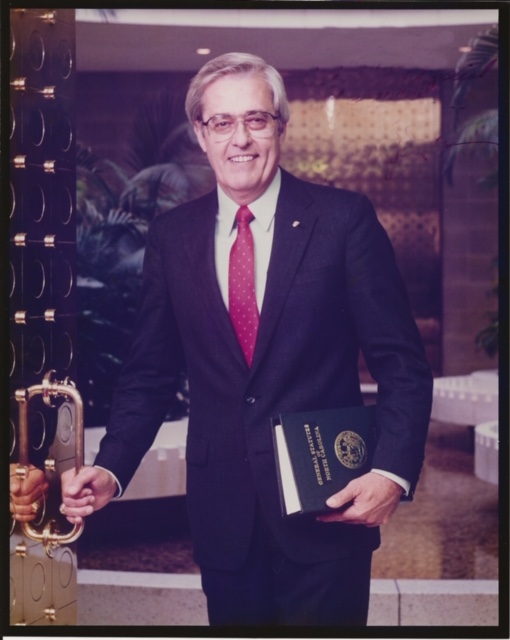
NC Loses Life Science, Civic, Business Leader Bob Jordan

A visionary leader who helped build the foundation for North Carolina’s global life science leadership, Robert B. “Bob” Jordan III, died today at the age of 87.
Jordan, whose name is immortalized in the Jordan Room at the North Carolina Biotechnology Center’s Research Triangle Park headquarters building, died peacefully at his home overlooking Lake Tillery in the Montgomery County town of Mount Gilead, located between Charlotte and Greensboro at the foot of the Uwharrie Mountains.
Jordan was an honors graduate of North Carolina State University in the School of Forestry. He was commissioned second lieutenant. in the U.S. Army after graduation in 1954 and served in Europe in 1955 to 1956, leaving the service as captain.
He served as CEO and president of Jordan Lumber & Supply, Inc. and its affiliates from the time he returned from the armed services, until being succeeded by his son, Robert, this year. Jordan Lumber is reported to be the world’s largest independently owned lumber wholesaler.
Jordan has been awarded the Order of the Long Leaf Pine, the state’s highest award for public service.
He served as a North Carolina state senator from 1976 to 1984, and as lieutenant governor from 1984 to 1988. He was prominent in the state’s establishment of the Biotech Center in 1984 as the world’s first state-funded economic development organization devoted to establishing North Carolina as a major life science power. This was in the face of the potential decline in other major North Carolina industries such as tobacco, furniture and textiles.
“It’s fair to say there would be no North Carolina Biotechnology Center without Bob Jordan,” said Gerry Hancock, a state senate colleague who was co-chair of the General Assembly’s Legislative Commission on Biotechnology, and the Biotech Center’s first board chair.
“He understood the vast potential of the life sciences to strengthen our economy and expand opportunity, particularly in core sectors of our modern economy – agriculture, forestry, medicine, pharmaceuticals, genomics. To secure North Carolina’s place as a national leader, at a time when that was far from ordained, he worked tirelessly in the Senate and as lieutenant governor to expand academic research capacities, to attract major companies and encourage new ones, and to assure that the Center had the resources and leadership necessary to lead this complex and multi-faceted enterprise over time.”
Charles Hamner Jr., D.V.M., who served 14 years as president and CEO of NCBiotech, added, “When I came to the Biotech Center in 1987 it was apparent that he was a key support for start-ups and an essential interface person when working with the Legislature and its committees. He was a wonderful, decent man who did much for his state.”
The family will receive visitors on Tuesday from 6 to 9 p.m. at the First United Methodist Church fellowship hall, 106 N. Main Street, Mt. Gilead, and on Wednesday at 11 a.m. in a Celebration of Life service at the West Montgomery High School auditorium, 147 Warrior Drive, also in Mt. Gilead. The public is also invited for a reception immediately following that service, at the First United Methodist Church fellowship hall.
In lieu of flowers, the family has requested that memorials be made to the North Carolina Biotechnology Center or to one of these other organizations that were especially important to Bob:
- NC Rural Economic Development Center, 4021 Cary Dr, Raleigh, NC 27610
- UNCG Teaching Fellows, Office of Student Services and Advisors School of Education Building, Room 142, 1300 Spring Garden St. Greensboro, NC 27402-6170
- Methodist Home for Children, 1041 Washington St, Raleigh, NC 27605
“Bob Jordan believed strongly in the future of the biotechnology industry and the impact it would have on people’s lives, not only with medicines but also in the ag tech sector,” said Brenda Summers, Ed.D., director of communications with the North Carolina Biosciences Organization who served as Jordan’s communications director while he was lieutenant governor.
“He was an innovator in the forestry industry throughout his career, and knew the importance of biotechnology in crops and also in nutrition," she added. "He often said in speeches that the lessons he learned running Jordan Lumber Company were the lessons he brought to government. Those lessons were that hands-on-leadership, hard work and a willingness to take on the status quo can earn success and secure a future of opportunity and prosperity.”
